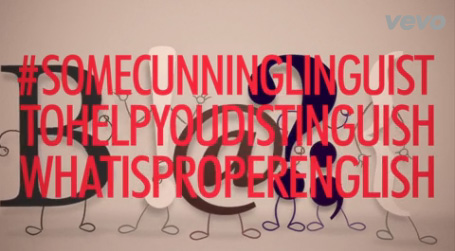John Lawler (thank you!) pointed me to this blog entry by John McIntyre, which was written in response to readers' requests for his reactions to "Weird Al" Yankovic's Word Crimes. I see that Mark Liberman is already a McIntyre fan (here, here, here, for instance), but I hadn't known about him before. I should — as John Lawler pointed out to me, he's an Oriole fan; and the Baltimore Sun, where he is an editor, was our family's daily paper through all my school years.
His notes on 'Word Crimes' really just consist of references that he agrees with, one by Stan Carey at Sentence first, and the recent guest post by Lauren Squires here on Language Log. He also refers to a couple of nice posts by our resident curmudgeon Geoff Pullum both here on LLog (on the curious English of police reports and the inability of journalists going on about the passive voice to accurately identify passive constructions) and in Lingua Franca (on ambiguity).
I don't have a very good excuse for passing this on — I'm just pleased to have been alerted to the existence of such a thoughtful and articulate writer who happens to be a copy editor by profession (and is a fellow Orioles fan!). I love his self-description: "mild-mannered editor for a great metropolitan newspaper, has fussed over writers' work, to sporadic expressions of gratitude, for thirty years. He is The Sun's night content production manager and former head of its copy desk. He also teaches editing at Loyola University Maryland. A former president of the American Copy Editors Society, a native of Kentucky, a graduate of Michigan State and Syracuse, and a moderate prescriptivist, he writes about language, journalism, and arbitrarily chosen topics."
I'm so glad that he's teaching editing, and wish there were more copy editors who were "moderate prescriptivists" like him!
